A Critical Review of Vogel's Explanations on Marx’s Alienation
VerifiedAdded on 2023/04/21
|6
|1692
|485
Essay
AI Summary
This essay provides a critical review of Steven Vogel's explanations on Marx's concept of alienation from nature. Vogel's critique centers on the idea that Marx viewed nature primarily for its utility to humans, neglecting its intrinsic value. The essay discusses the 'deep ecology' movement, which emphasizes limiting human intervention in nature, and contrasts it with Marx's historical approach to understanding the human-environment relationship. It argues that while the 'deep ecology' critique has merit, it can also lead to an alienated view of nature. The essay further explores how capitalist modes of production create a separation from nature, viewing it as an opponent to be conquered. Ultimately, the essay supports Marx's conception that humans are integral to nature, and that overcoming alienation requires societal changes that prioritize the interests of all, rather than just profit. Desklib provides a platform to access similar essays and study resources for students.
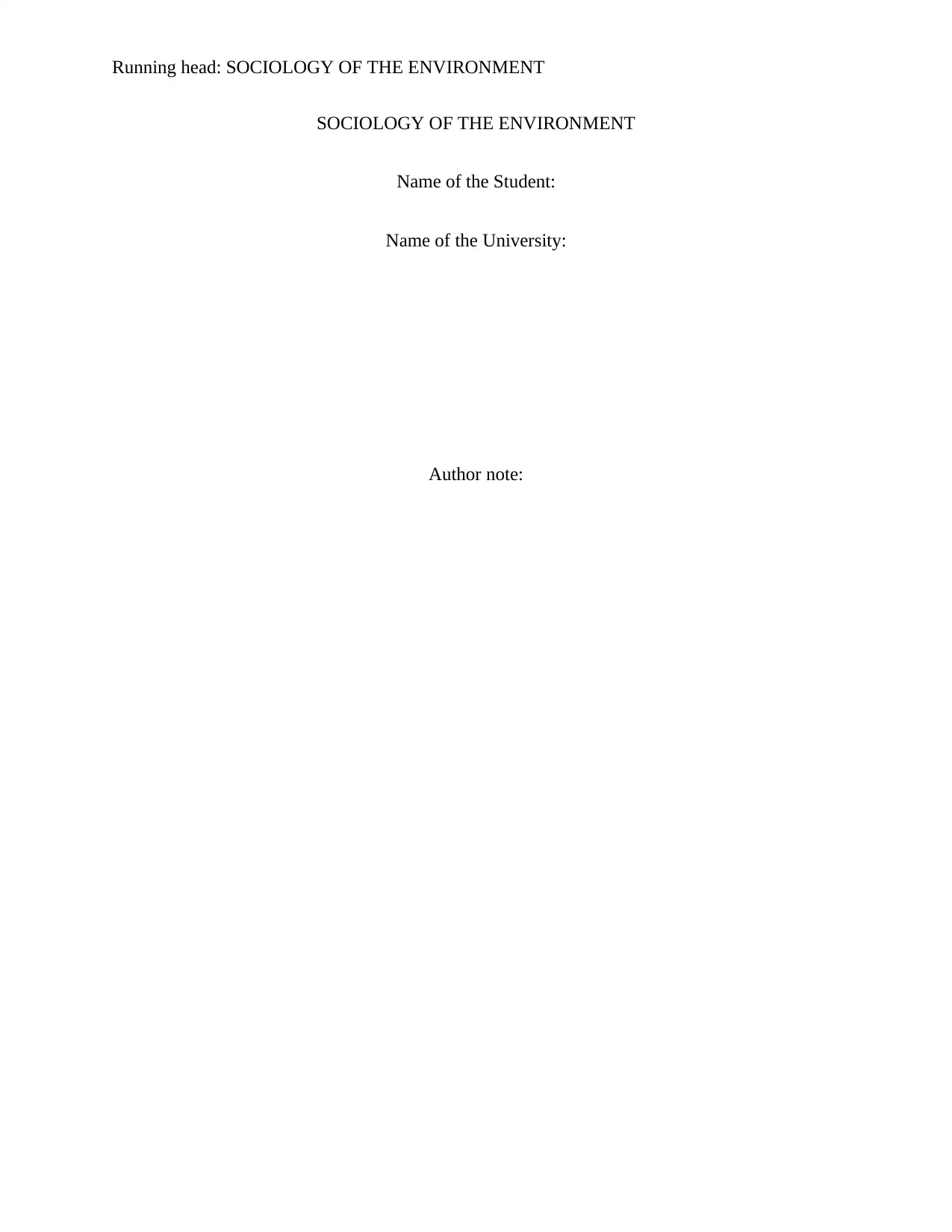
Running head: SOCIOLOGY OF THE ENVIRONMENT
SOCIOLOGY OF THE ENVIRONMENT
Name of the Student:
Name of the University:
Author note:
SOCIOLOGY OF THE ENVIRONMENT
Name of the Student:
Name of the University:
Author note:
Paraphrase This Document
Need a fresh take? Get an instant paraphrase of this document with our AI Paraphraser
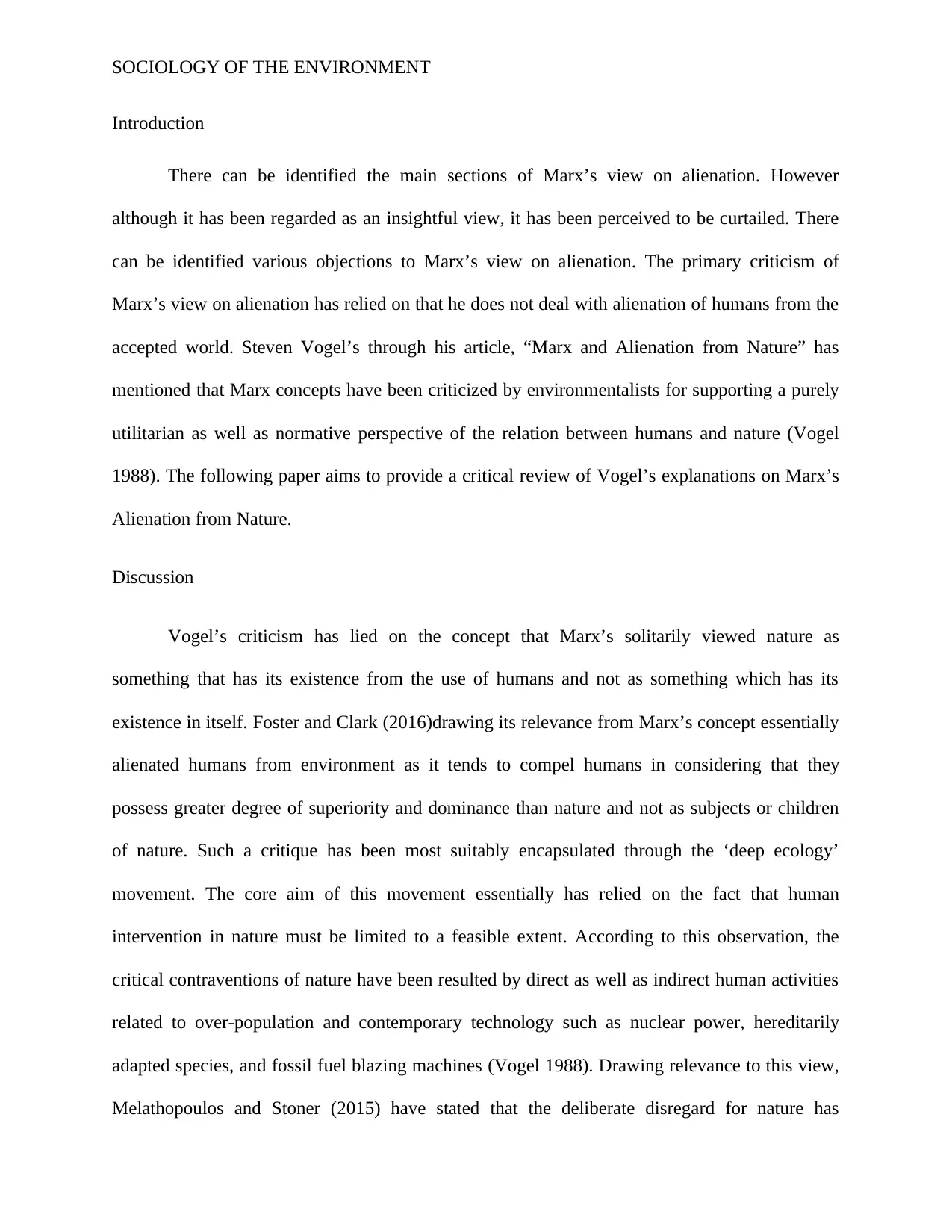
SOCIOLOGY OF THE ENVIRONMENT
Introduction
There can be identified the main sections of Marx’s view on alienation. However
although it has been regarded as an insightful view, it has been perceived to be curtailed. There
can be identified various objections to Marx’s view on alienation. The primary criticism of
Marx’s view on alienation has relied on that he does not deal with alienation of humans from the
accepted world. Steven Vogel’s through his article, “Marx and Alienation from Nature” has
mentioned that Marx concepts have been criticized by environmentalists for supporting a purely
utilitarian as well as normative perspective of the relation between humans and nature (Vogel
1988). The following paper aims to provide a critical review of Vogel’s explanations on Marx’s
Alienation from Nature.
Discussion
Vogel’s criticism has lied on the concept that Marx’s solitarily viewed nature as
something that has its existence from the use of humans and not as something which has its
existence in itself. Foster and Clark (2016)drawing its relevance from Marx’s concept essentially
alienated humans from environment as it tends to compel humans in considering that they
possess greater degree of superiority and dominance than nature and not as subjects or children
of nature. Such a critique has been most suitably encapsulated through the ‘deep ecology’
movement. The core aim of this movement essentially has relied on the fact that human
intervention in nature must be limited to a feasible extent. According to this observation, the
critical contraventions of nature have been resulted by direct as well as indirect human activities
related to over-population and contemporary technology such as nuclear power, hereditarily
adapted species, and fossil fuel blazing machines (Vogel 1988). Drawing relevance to this view,
Melathopoulos and Stoner (2015) have stated that the deliberate disregard for nature has
Introduction
There can be identified the main sections of Marx’s view on alienation. However
although it has been regarded as an insightful view, it has been perceived to be curtailed. There
can be identified various objections to Marx’s view on alienation. The primary criticism of
Marx’s view on alienation has relied on that he does not deal with alienation of humans from the
accepted world. Steven Vogel’s through his article, “Marx and Alienation from Nature” has
mentioned that Marx concepts have been criticized by environmentalists for supporting a purely
utilitarian as well as normative perspective of the relation between humans and nature (Vogel
1988). The following paper aims to provide a critical review of Vogel’s explanations on Marx’s
Alienation from Nature.
Discussion
Vogel’s criticism has lied on the concept that Marx’s solitarily viewed nature as
something that has its existence from the use of humans and not as something which has its
existence in itself. Foster and Clark (2016)drawing its relevance from Marx’s concept essentially
alienated humans from environment as it tends to compel humans in considering that they
possess greater degree of superiority and dominance than nature and not as subjects or children
of nature. Such a critique has been most suitably encapsulated through the ‘deep ecology’
movement. The core aim of this movement essentially has relied on the fact that human
intervention in nature must be limited to a feasible extent. According to this observation, the
critical contraventions of nature have been resulted by direct as well as indirect human activities
related to over-population and contemporary technology such as nuclear power, hereditarily
adapted species, and fossil fuel blazing machines (Vogel 1988). Drawing relevance to this view,
Melathopoulos and Stoner (2015) have stated that the deliberate disregard for nature has
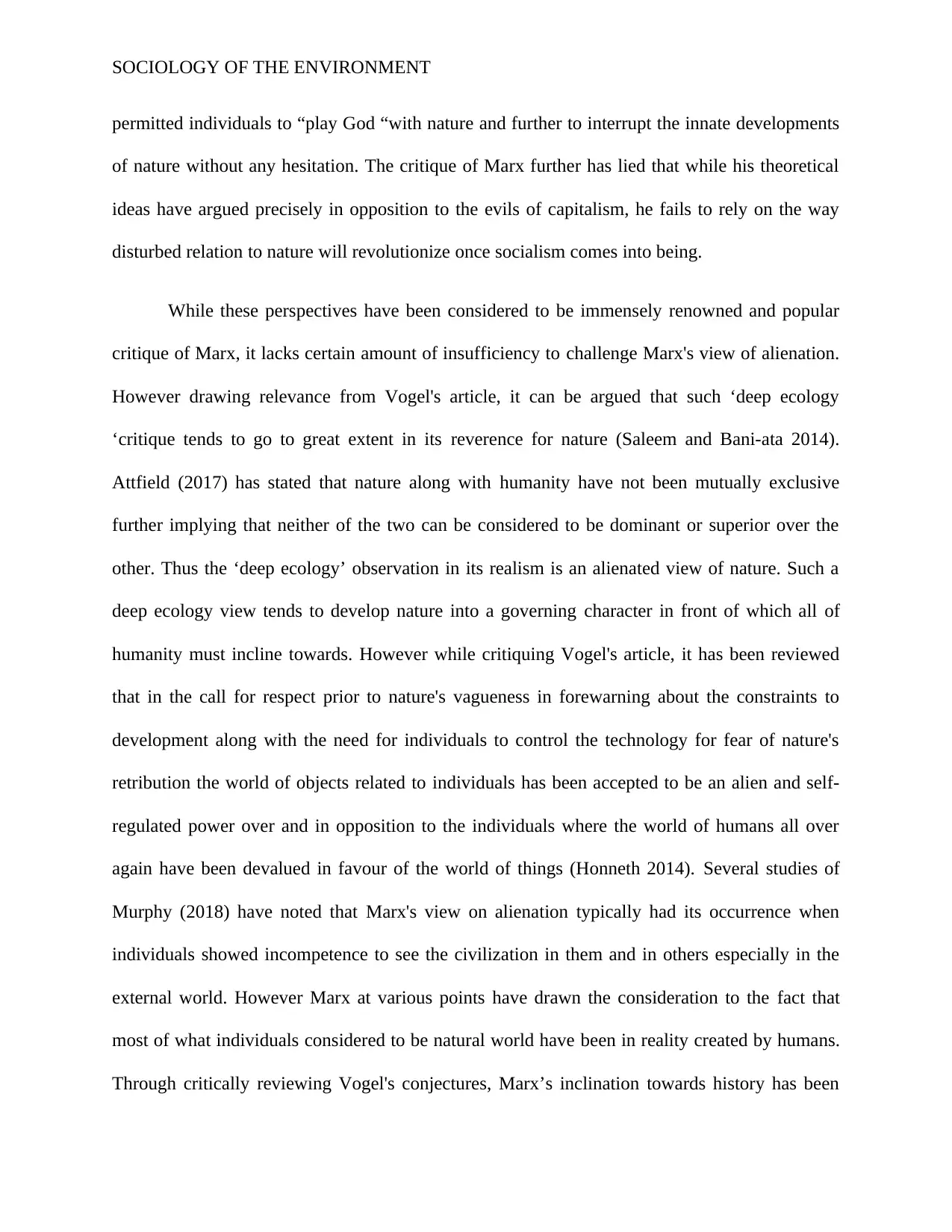
SOCIOLOGY OF THE ENVIRONMENT
permitted individuals to “play God “with nature and further to interrupt the innate developments
of nature without any hesitation. The critique of Marx further has lied that while his theoretical
ideas have argued precisely in opposition to the evils of capitalism, he fails to rely on the way
disturbed relation to nature will revolutionize once socialism comes into being.
While these perspectives have been considered to be immensely renowned and popular
critique of Marx, it lacks certain amount of insufficiency to challenge Marx's view of alienation.
However drawing relevance from Vogel's article, it can be argued that such ‘deep ecology
‘critique tends to go to great extent in its reverence for nature (Saleem and Bani-ata 2014).
Attfield (2017) has stated that nature along with humanity have not been mutually exclusive
further implying that neither of the two can be considered to be dominant or superior over the
other. Thus the ‘deep ecology’ observation in its realism is an alienated view of nature. Such a
deep ecology view tends to develop nature into a governing character in front of which all of
humanity must incline towards. However while critiquing Vogel's article, it has been reviewed
that in the call for respect prior to nature's vagueness in forewarning about the constraints to
development along with the need for individuals to control the technology for fear of nature's
retribution the world of objects related to individuals has been accepted to be an alien and self-
regulated power over and in opposition to the individuals where the world of humans all over
again have been devalued in favour of the world of things (Honneth 2014). Several studies of
Murphy (2018) have noted that Marx's view on alienation typically had its occurrence when
individuals showed incompetence to see the civilization in them and in others especially in the
external world. However Marx at various points have drawn the consideration to the fact that
most of what individuals considered to be natural world have been in reality created by humans.
Through critically reviewing Vogel's conjectures, Marx’s inclination towards history has been
permitted individuals to “play God “with nature and further to interrupt the innate developments
of nature without any hesitation. The critique of Marx further has lied that while his theoretical
ideas have argued precisely in opposition to the evils of capitalism, he fails to rely on the way
disturbed relation to nature will revolutionize once socialism comes into being.
While these perspectives have been considered to be immensely renowned and popular
critique of Marx, it lacks certain amount of insufficiency to challenge Marx's view of alienation.
However drawing relevance from Vogel's article, it can be argued that such ‘deep ecology
‘critique tends to go to great extent in its reverence for nature (Saleem and Bani-ata 2014).
Attfield (2017) has stated that nature along with humanity have not been mutually exclusive
further implying that neither of the two can be considered to be dominant or superior over the
other. Thus the ‘deep ecology’ observation in its realism is an alienated view of nature. Such a
deep ecology view tends to develop nature into a governing character in front of which all of
humanity must incline towards. However while critiquing Vogel's article, it has been reviewed
that in the call for respect prior to nature's vagueness in forewarning about the constraints to
development along with the need for individuals to control the technology for fear of nature's
retribution the world of objects related to individuals has been accepted to be an alien and self-
regulated power over and in opposition to the individuals where the world of humans all over
again have been devalued in favour of the world of things (Honneth 2014). Several studies of
Murphy (2018) have noted that Marx's view on alienation typically had its occurrence when
individuals showed incompetence to see the civilization in them and in others especially in the
external world. However Marx at various points have drawn the consideration to the fact that
most of what individuals considered to be natural world have been in reality created by humans.
Through critically reviewing Vogel's conjectures, Marx’s inclination towards history has been
⊘ This is a preview!⊘
Do you want full access?
Subscribe today to unlock all pages.

Trusted by 1+ million students worldwide
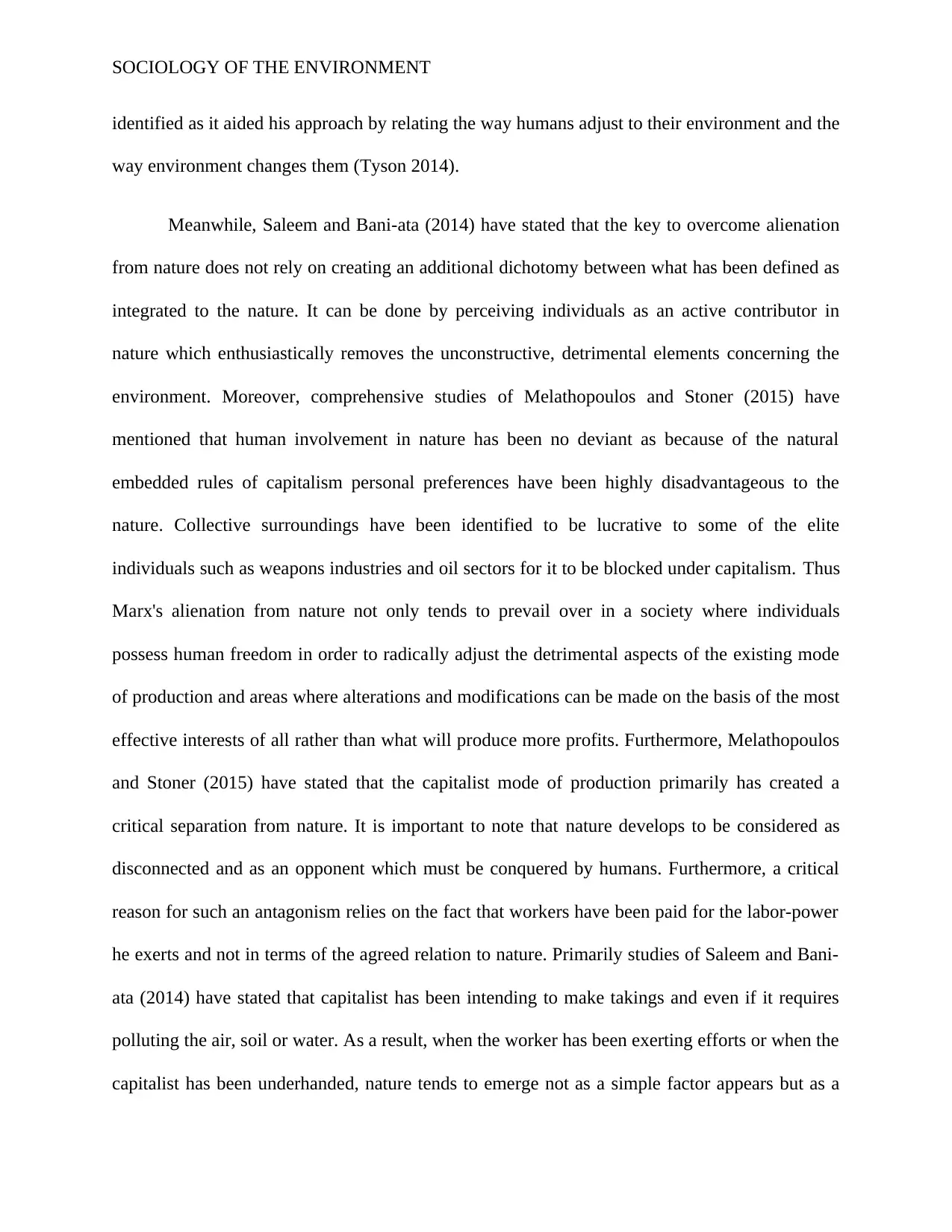
SOCIOLOGY OF THE ENVIRONMENT
identified as it aided his approach by relating the way humans adjust to their environment and the
way environment changes them (Tyson 2014).
Meanwhile, Saleem and Bani-ata (2014) have stated that the key to overcome alienation
from nature does not rely on creating an additional dichotomy between what has been defined as
integrated to the nature. It can be done by perceiving individuals as an active contributor in
nature which enthusiastically removes the unconstructive, detrimental elements concerning the
environment. Moreover, comprehensive studies of Melathopoulos and Stoner (2015) have
mentioned that human involvement in nature has been no deviant as because of the natural
embedded rules of capitalism personal preferences have been highly disadvantageous to the
nature. Collective surroundings have been identified to be lucrative to some of the elite
individuals such as weapons industries and oil sectors for it to be blocked under capitalism. Thus
Marx's alienation from nature not only tends to prevail over in a society where individuals
possess human freedom in order to radically adjust the detrimental aspects of the existing mode
of production and areas where alterations and modifications can be made on the basis of the most
effective interests of all rather than what will produce more profits. Furthermore, Melathopoulos
and Stoner (2015) have stated that the capitalist mode of production primarily has created a
critical separation from nature. It is important to note that nature develops to be considered as
disconnected and as an opponent which must be conquered by humans. Furthermore, a critical
reason for such an antagonism relies on the fact that workers have been paid for the labor-power
he exerts and not in terms of the agreed relation to nature. Primarily studies of Saleem and Bani-
ata (2014) have stated that capitalist has been intending to make takings and even if it requires
polluting the air, soil or water. As a result, when the worker has been exerting efforts or when the
capitalist has been underhanded, nature tends to emerge not as a simple factor appears but as a
identified as it aided his approach by relating the way humans adjust to their environment and the
way environment changes them (Tyson 2014).
Meanwhile, Saleem and Bani-ata (2014) have stated that the key to overcome alienation
from nature does not rely on creating an additional dichotomy between what has been defined as
integrated to the nature. It can be done by perceiving individuals as an active contributor in
nature which enthusiastically removes the unconstructive, detrimental elements concerning the
environment. Moreover, comprehensive studies of Melathopoulos and Stoner (2015) have
mentioned that human involvement in nature has been no deviant as because of the natural
embedded rules of capitalism personal preferences have been highly disadvantageous to the
nature. Collective surroundings have been identified to be lucrative to some of the elite
individuals such as weapons industries and oil sectors for it to be blocked under capitalism. Thus
Marx's alienation from nature not only tends to prevail over in a society where individuals
possess human freedom in order to radically adjust the detrimental aspects of the existing mode
of production and areas where alterations and modifications can be made on the basis of the most
effective interests of all rather than what will produce more profits. Furthermore, Melathopoulos
and Stoner (2015) have stated that the capitalist mode of production primarily has created a
critical separation from nature. It is important to note that nature develops to be considered as
disconnected and as an opponent which must be conquered by humans. Furthermore, a critical
reason for such an antagonism relies on the fact that workers have been paid for the labor-power
he exerts and not in terms of the agreed relation to nature. Primarily studies of Saleem and Bani-
ata (2014) have stated that capitalist has been intending to make takings and even if it requires
polluting the air, soil or water. As a result, when the worker has been exerting efforts or when the
capitalist has been underhanded, nature tends to emerge not as a simple factor appears but as a
Paraphrase This Document
Need a fresh take? Get an instant paraphrase of this document with our AI Paraphraser
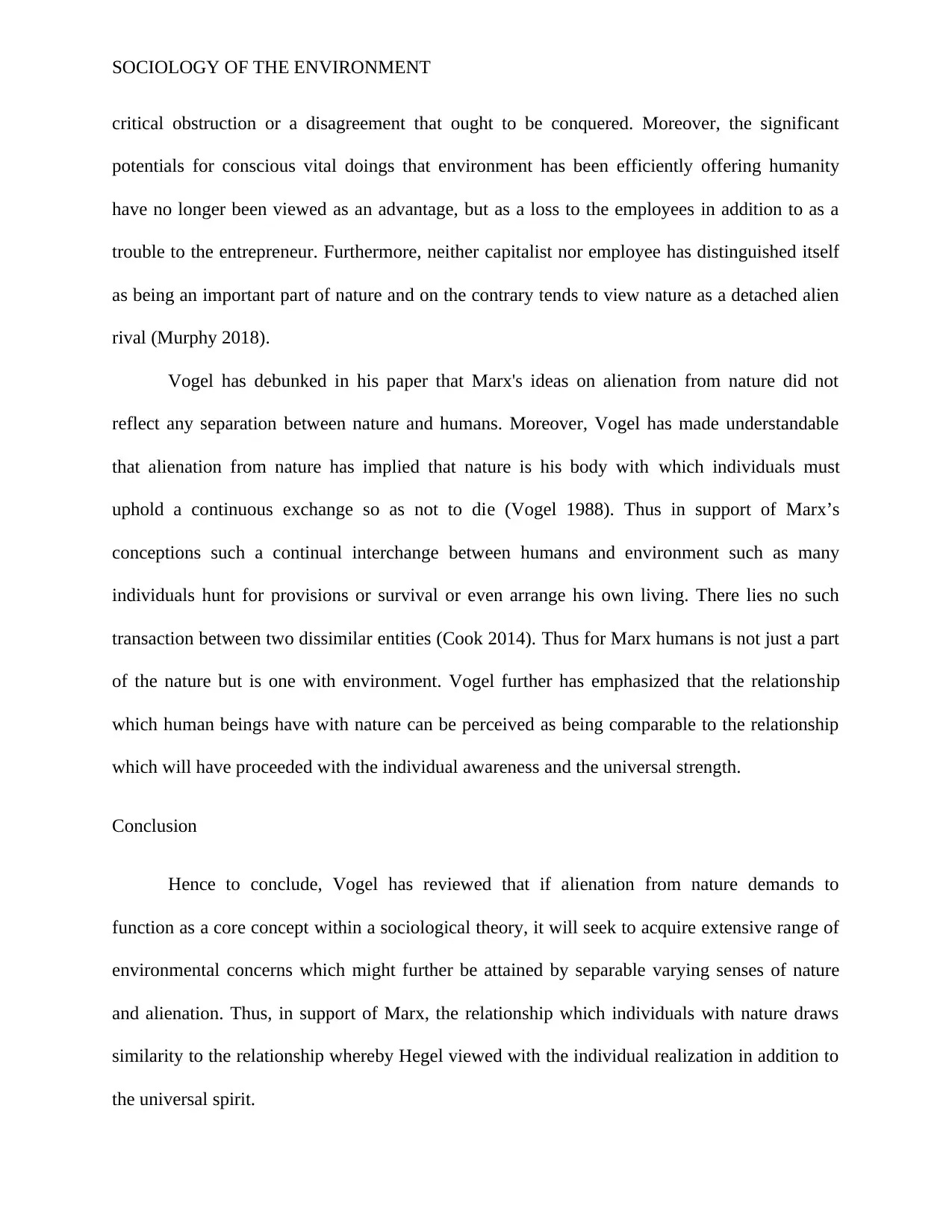
SOCIOLOGY OF THE ENVIRONMENT
critical obstruction or a disagreement that ought to be conquered. Moreover, the significant
potentials for conscious vital doings that environment has been efficiently offering humanity
have no longer been viewed as an advantage, but as a loss to the employees in addition to as a
trouble to the entrepreneur. Furthermore, neither capitalist nor employee has distinguished itself
as being an important part of nature and on the contrary tends to view nature as a detached alien
rival (Murphy 2018).
Vogel has debunked in his paper that Marx's ideas on alienation from nature did not
reflect any separation between nature and humans. Moreover, Vogel has made understandable
that alienation from nature has implied that nature is his body with which individuals must
uphold a continuous exchange so as not to die (Vogel 1988). Thus in support of Marx’s
conceptions such a continual interchange between humans and environment such as many
individuals hunt for provisions or survival or even arrange his own living. There lies no such
transaction between two dissimilar entities (Cook 2014). Thus for Marx humans is not just a part
of the nature but is one with environment. Vogel further has emphasized that the relationship
which human beings have with nature can be perceived as being comparable to the relationship
which will have proceeded with the individual awareness and the universal strength.
Conclusion
Hence to conclude, Vogel has reviewed that if alienation from nature demands to
function as a core concept within a sociological theory, it will seek to acquire extensive range of
environmental concerns which might further be attained by separable varying senses of nature
and alienation. Thus, in support of Marx, the relationship which individuals with nature draws
similarity to the relationship whereby Hegel viewed with the individual realization in addition to
the universal spirit.
critical obstruction or a disagreement that ought to be conquered. Moreover, the significant
potentials for conscious vital doings that environment has been efficiently offering humanity
have no longer been viewed as an advantage, but as a loss to the employees in addition to as a
trouble to the entrepreneur. Furthermore, neither capitalist nor employee has distinguished itself
as being an important part of nature and on the contrary tends to view nature as a detached alien
rival (Murphy 2018).
Vogel has debunked in his paper that Marx's ideas on alienation from nature did not
reflect any separation between nature and humans. Moreover, Vogel has made understandable
that alienation from nature has implied that nature is his body with which individuals must
uphold a continuous exchange so as not to die (Vogel 1988). Thus in support of Marx’s
conceptions such a continual interchange between humans and environment such as many
individuals hunt for provisions or survival or even arrange his own living. There lies no such
transaction between two dissimilar entities (Cook 2014). Thus for Marx humans is not just a part
of the nature but is one with environment. Vogel further has emphasized that the relationship
which human beings have with nature can be perceived as being comparable to the relationship
which will have proceeded with the individual awareness and the universal strength.
Conclusion
Hence to conclude, Vogel has reviewed that if alienation from nature demands to
function as a core concept within a sociological theory, it will seek to acquire extensive range of
environmental concerns which might further be attained by separable varying senses of nature
and alienation. Thus, in support of Marx, the relationship which individuals with nature draws
similarity to the relationship whereby Hegel viewed with the individual realization in addition to
the universal spirit.
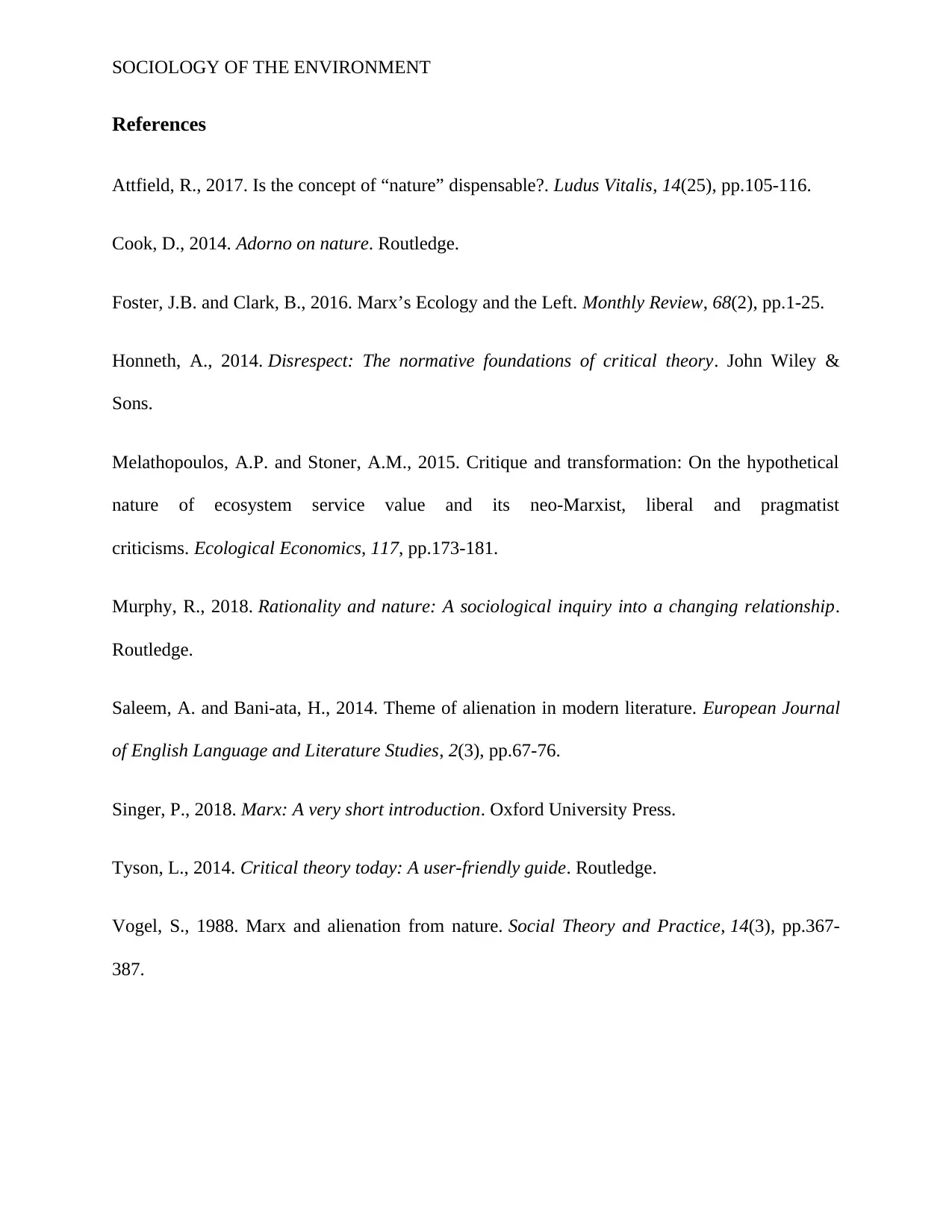
SOCIOLOGY OF THE ENVIRONMENT
References
Attfield, R., 2017. Is the concept of “nature” dispensable?. Ludus Vitalis, 14(25), pp.105-116.
Cook, D., 2014. Adorno on nature. Routledge.
Foster, J.B. and Clark, B., 2016. Marx’s Ecology and the Left. Monthly Review, 68(2), pp.1-25.
Honneth, A., 2014. Disrespect: The normative foundations of critical theory. John Wiley &
Sons.
Melathopoulos, A.P. and Stoner, A.M., 2015. Critique and transformation: On the hypothetical
nature of ecosystem service value and its neo-Marxist, liberal and pragmatist
criticisms. Ecological Economics, 117, pp.173-181.
Murphy, R., 2018. Rationality and nature: A sociological inquiry into a changing relationship.
Routledge.
Saleem, A. and Bani-ata, H., 2014. Theme of alienation in modern literature. European Journal
of English Language and Literature Studies, 2(3), pp.67-76.
Singer, P., 2018. Marx: A very short introduction. Oxford University Press.
Tyson, L., 2014. Critical theory today: A user-friendly guide. Routledge.
Vogel, S., 1988. Marx and alienation from nature. Social Theory and Practice, 14(3), pp.367-
387.
References
Attfield, R., 2017. Is the concept of “nature” dispensable?. Ludus Vitalis, 14(25), pp.105-116.
Cook, D., 2014. Adorno on nature. Routledge.
Foster, J.B. and Clark, B., 2016. Marx’s Ecology and the Left. Monthly Review, 68(2), pp.1-25.
Honneth, A., 2014. Disrespect: The normative foundations of critical theory. John Wiley &
Sons.
Melathopoulos, A.P. and Stoner, A.M., 2015. Critique and transformation: On the hypothetical
nature of ecosystem service value and its neo-Marxist, liberal and pragmatist
criticisms. Ecological Economics, 117, pp.173-181.
Murphy, R., 2018. Rationality and nature: A sociological inquiry into a changing relationship.
Routledge.
Saleem, A. and Bani-ata, H., 2014. Theme of alienation in modern literature. European Journal
of English Language and Literature Studies, 2(3), pp.67-76.
Singer, P., 2018. Marx: A very short introduction. Oxford University Press.
Tyson, L., 2014. Critical theory today: A user-friendly guide. Routledge.
Vogel, S., 1988. Marx and alienation from nature. Social Theory and Practice, 14(3), pp.367-
387.
⊘ This is a preview!⊘
Do you want full access?
Subscribe today to unlock all pages.

Trusted by 1+ million students worldwide
1 out of 6
Related Documents
Your All-in-One AI-Powered Toolkit for Academic Success.
+13062052269
info@desklib.com
Available 24*7 on WhatsApp / Email
![[object Object]](/_next/static/media/star-bottom.7253800d.svg)
Unlock your academic potential
Copyright © 2020–2026 A2Z Services. All Rights Reserved. Developed and managed by ZUCOL.



